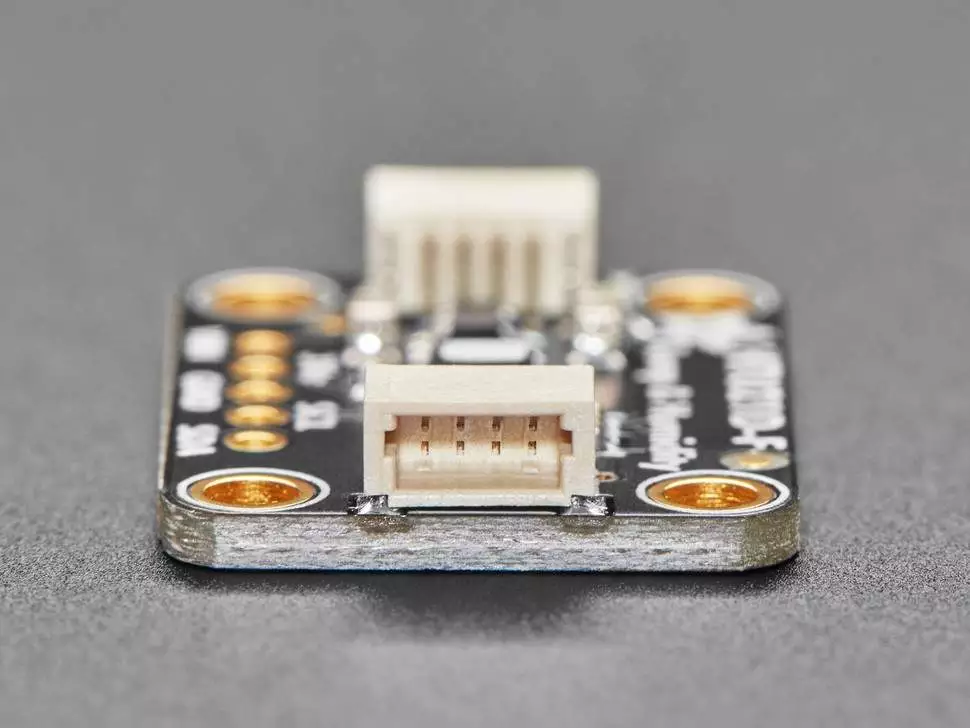A humidity sensor is an electronic device designed to measure and report the humidity and air temperature in the surrounding environment, whether it's in the air, soil, or enclosed spaces. Humidity measurements indicate the concentration of water vapor present in the air, providing measurement results in an appropriate electronic signal format. Additionally, they report relative humidity, which is the ratio of moisture to the maximum moisture content at a given temperature. Relative humidity is valuable for various applications, including HVAC (Heating, Ventilation, and Air Conditioning) and comfort optimization in smart buildings and facility management. Advanced humidity sensors support internet connectivity, enabling flexible deployment in Internet of Things (IoT) applications. This facilitates the integration of humidity measurements with outputs from other sensors, such as temperature sensors, enhancing IoT intelligence in various industry applications.
The quality of humidity sensors is reflected in their accuracy, reliability, response time, lifespan, security, ruggedness, and ease of deployment, all of which influence their cost. These characteristics also drive the selection of humidity sensors for different applications. Humidity sensing can provide a plethora of value-added use cases across various industries, including cold storage management, comfort optimization, asset condition tracking, and remote monitoring.
1. Humidity Sensors in Cold Storage Management
In cold storage management, humidity sensing ensures suitable storage conditions for temperature-sensitive products like food, beverages, and pharmaceuticals. Humidity sensors contribute to regulatory compliance and assist in automating equipment status checks. When combined with temperature sensors, they also enhance product safety while reducing waste. Overall, the combination of temperature and humidity sensors in cold storage management can lead to the development of robust regulatory compliance tools, automated audits, improved product safety, and enhanced environmental performance.
2. Humidity Sensors in Smart Buildings and Facility Management
In smart buildings, humidity sensors are deployed to enhance comfort for occupants. For example, they provide insights into the humidity conditions of specific rooms, which can then drive minor adjustments to room conditions through Building Management Systems (BMS). By adding humidity sensors to HVAC systems and office environments, facility managers can effectively monitor, measure, and adjust humidity to provide a comfortable and efficient working environment. In many cases, humidity sensors complement temperature monitoring functions, increasing comfort and optimizing energy consumption.
Apart from comfort, humidity sensing is crucial for ensuring proper conditions for valuable assets. Galleries, museums, and art collectors, for instance, can maintain stable environmental conditions for their collections. To do so, they should track humidity variations as moisture can be disastrous for paintings, drawings, prints, mosaics, and sculptures. Humidity monitoring helps galleries and museums protect their assets and reduce insurance costs.
3. Humidity Sensors in Remote Monitoring and Smart Asset Management
Humidity sensors are also integral to remote monitoring and smart asset management scenarios. They can be deployed on assets such as pumps, compressors, fans, and data centers, facilitating the transition from preventive maintenance to predictive maintenance. Specifically, humidity sensor data streams can improve the accuracy of condition-based monitoring for predictive analytics. They can also provide real-time humidity monitoring to identify issues before they occur, such as potential leaks. Through these means, humidity sensors can extend the lifespan of critical assets and maximize their overall efficiency.
In many cases, humidity sensors are used in conjunction with other sensor types, such as temperature, proximity, touch, and water sensors, to offer additional value-added services in smart building and facility management environments. A complete sensor solution helps facility managers differentiate themselves from competitors.
In conclusion, humidity sensors play a crucial role in various industries, offering valuable insights into environmental conditions, ensuring compliance with regulations, enhancing comfort, protecting assets, and optimizing asset management. Their integration into IoT applications continues to drive innovation and intelligence in a wide range of fields.

Previous: Applications of Dust Sensors
Next: Causes and Solutions for Drift in Temperature and Humidity Sensors





